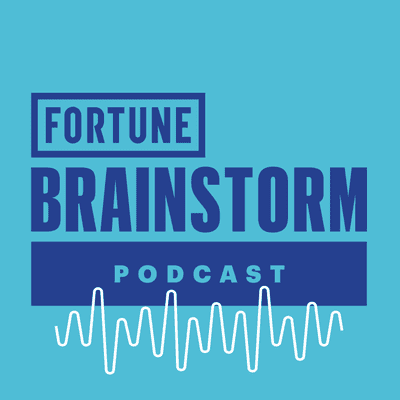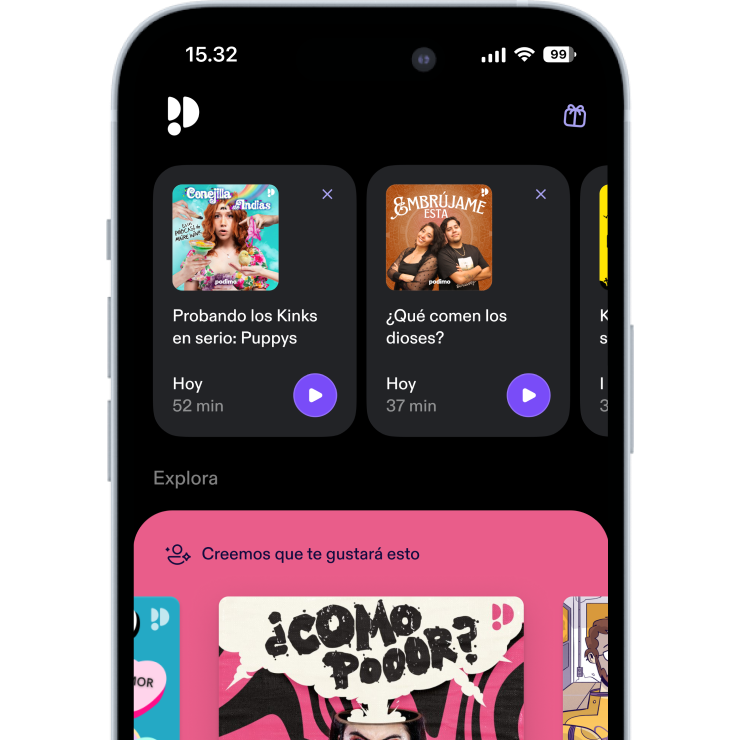
Brainstorm
Podcast de Fortune
Empieza 7 días de prueba
$99.00 / mes después de la prueba.Cancela cuando quieras.

Más de 1 millón de oyentes
Podimo te va a encantar, y no estás solo/a
Rated 4.7 in the App Store
Acerca de Brainstorm
Technology is disrupting our world and reshaping our lives, sometimes in ways we don't realize. In this weekly podcast, Fortune Senior Writer Michal Lev-Ram and Deputy Editor Brian O'Keefe dig behind the headlines to explore the world of tech. They speak with leaders of some of the biggest companies - and others perhaps you've never heard of - and call on industry experts for insight. Fortune's team of tech reporters and writers also weighs in on what's happening in technology news and why it matters for everyone.
Todos los episodios
42 episodiosThe last time Tokyo hosted the Summer Games was 1964. That was the first Olympics to be televised live, around the world, and in color. The event continues to be a hotspot of innovation for broadcast. Tuning in this year you may hear mention of an athlete's metabolic data, or analysis comparing the acceleration of runners. New tech is capturing this information and spitting out the details within seconds. In today's Brainstorm you'll learn about a variety of ways technology is improving the Olympic viewing experience - providing more data and cooler camera angles than ever before. Also in today's episode, how athletes are increasingly using technology to improve their skills, and how one Olympic team is employing a unique product to protect against COVID-19. Guests include Gary Saunders, president of Kontrol Biocloud; Rick Echevarria, general manager of Intel's Olympics and Paralympics Program; and Ashton Eaton, a gold-medal Olympian, product engineer at Intel and advisor to the Wu Tsai Human Performance Alliance.
In the past two weeks, both Sir Richard Branson and Amazon's Jeff Bezos flew into space on their own rockets. Space tourism, they say, is just around the corner: anyone who can pay the price of admission can now travel outside our home planet. In the flurry of headlines that followed, it’s easy to forget these billionaire-astronauts – along with Elon Musk – have been investing heavily in the commercial space industry for nearly two decades. There’s an obvious, immediate business case: Satellites help fuel the information economy. But the longer-term ambitions of a commercial space sector are deeply imaginative, if not fanciful. Human colonies on the moon, earth-orbiting-hotels, mining asteroids for precious metals. On today’s Brainstorm, Michal Lev-Ram and Brian O’Keefe discuss the rise of the commercial space sector and the technological breakthroughs it hopes to realize. Christian Maender, director of in-space manufacturing and research at unicorn Axiom Space, describes the company’s plans to build the first private space station. Peter Hughes, the Center Chief Technologist for NASA’s Goddard Space Flight Center applauds the space-minded venture capitalists. Up in orbit, he says, the more the merrier. Also in the episode, Mehak Sarang, research associate at Harvard Business School, discusses the limitless possibilities for scientific and technological breakthroughs that space affords.
In a digital world, the ability to code – to train a computer, using its own language – is key, hence the enormous push to make people literate in programming languages. “Don’t just play on your phone,” urged President Barack Obama in 2013, “program it.” But today the demand for digital applications outstrips the programming talent. The became especially clear during COVID-19, when digital accessibility became a necessity. Enter low-code and no-code application development: Platforms where software is configured visually, using drag and drop interfaces. They’re faster and cheaper to use than traditional coding, but how well do they work? On today’s Brainstorm, Brian O’Keefe and Fortune’s Robert Hackett discuss the promise of low-code and no-code platforms, and how they've stood the test of emergency situations brought on by the COVID-19 pandemic. Laela Sturdy is a general partner at CapitalG, Alphabet’s independent growth fund, which helps growth-stage tech companies scale. She says the attraction of these platforms is to enable creators and non-technical people to access the power and magic of code. Michael Beckley is the Chief Technology Officer of Appian, the first company to go public as a low-code vendor. He says low-code has the power to deliver clients perfectly tailored software in half the time. Also in this episode, Veronica Soto, director of San Antonio’s Neighborhood and Housing Services Department describes digitizing an entire rental assistance program in a week, at the outset of the pandemic, in partnership with low-code platform Mendix.
Fortune's Brainstorm podcast is on vacation this week, but will return next Thursday with a new episode. In the meantime, we bring you another Fortune podcast: Leadership Next [https://podcasts.apple.com/us/podcast/leadership-next/id1501891506] (subscribe wherever you get your podcasts). Each Week, Alan Murray and Ellen McGirt interview CEOs from major companies like Intel, Hilton and Etsy. This episode of Leadership Next features Peggy Johnson, CEO of Magic Leap. The company's augmented headset never really took off with consumers, so now, Magic Leap is on a mission to find new users for its technology. Peggy spoke with Alan and Ellen earlier in the year.
Driverless cars are supposed to eliminate traffic, prevent millions of deaths and injuries, reduce congestion, and slash carbon emissions. And, they were supposed to be on our streets by now. In 2016, then-Secretary of Transportation, Anthony Foxx, now the Chief Policy Officer at Lyft, said in an interview that by 2021 “families will be able to walk out of their homes and call [an autonomous] vehicle, and that vehicle will take them to work or to school.” He wasn't the only one to make such claims. On today’s Brainstorm, Michal Lev-Ram and Brian O’Keefe examine why autonomous vehicles (AVs) have yet to go mainstream, and what needs to happen in order for us to take our hands off the wheel. Laura Major is coauthor of the book “What to Expect When You’re Expecting Robots” as well as the Chief Technology Officer for Motional. Motional is a joint venture between Hyundai and Aptiv, currently partnering with Lyft on robotaxis in Las Vegas. She explains the experience of riding in a robotaxi, and how the company is approaching technical challenges it's facing. Jody Kelman, the General Manager of Lyft Autonomous, talks about what needs to happen for riders to feel comfortable in AVs, and about consolidation in the industry. Also in this episode, Missy Cummings of Duke University and Rob Seamens of NYU explain the hype behind AVs, the unresolved technological hurdles, and the regulatory ambiguity that stands in the way of widespread adoption.

Rated 4.7 in the App Store
Empieza 7 días de prueba
$99.00 / mes después de la prueba.Cancela cuando quieras.
Podcasts exclusivos
Sin anuncios
Podcast gratuitos
Audiolibros
20 horas / mes























